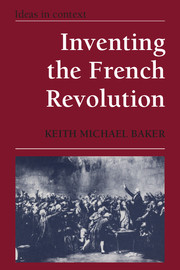Book contents
- Frontmatter
- Contents
- Acknowledgments
- Introduction
- 1 On the problem of the ideological origins of the French Revolution
- Part I French history at issue
- Part II The language of politics at the end of the Old Regime
- 5 French political thought at the accession of Louis XVI
- 6 A classical republican in eighteenth-century Bordeaux: Guillaume-Joseph Saige
- 7 Science and politics at the end of the Old Regime
- 8 Public opinion as political invention
- Part III Toward a revolutionary lexicon
- Notes
- Index
7 - Science and politics at the end of the Old Regime
Published online by Cambridge University Press: 05 June 2012
- Frontmatter
- Contents
- Acknowledgments
- Introduction
- 1 On the problem of the ideological origins of the French Revolution
- Part I French history at issue
- Part II The language of politics at the end of the Old Regime
- 5 French political thought at the accession of Louis XVI
- 6 A classical republican in eighteenth-century Bordeaux: Guillaume-Joseph Saige
- 7 Science and politics at the end of the Old Regime
- 8 Public opinion as political invention
- Part III Toward a revolutionary lexicon
- Notes
- Index
Summary
What is it that statesmen have generally wanted from science? They have not wanted admonitions or collaboration, much less interference, in the business of government, which is the exercise of power over persons, nor in the political maneuverings to secure and retain control over governments. From science, all the statesmen and politicians want are instrumentalities, powers but not power: weapons, techniques, information, communications, and so on. As for scientists, what have they wanted of governments? They have expressly not wished to be politicized. They have wanted support, in the obvious form of funds, but also in the shape of institutionalization and in the provision of authority for the legitimation of their community in its existence and in its activities, or in other words for its professional status.
With these words, Charles Gillispie concluded his comprehensive study of the relationship between science and polity in France at the end of the Old Regime, the period in which that relationship “began to assume a form characteristic of the modern state and of modern science.” In doing so, he invited us to consider as characteristic – then as now – a pattern of instrumental interaction between science and polity, ordered as a mutually beneficial but strictly limited partnership between two clearly separate and occasionally intersecting domains of activity. This pattern, Gillispie argues, “inheres in the nature of science and of politics.” Since politics is by definition the exercise of power over persons, and science by definition the search for knowledge of things, a basic separation is clearly required to maintain the identity and integrity of the two activities.
- Type
- Chapter
- Information
- Inventing the French RevolutionEssays on French Political Culture in the Eighteenth Century, pp. 153 - 166Publisher: Cambridge University PressPrint publication year: 1990

